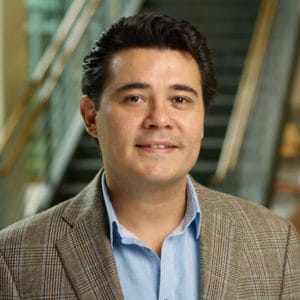Rodríguez and team awarded major grant to study declining life expectancies

The latest statistics on U.S. life expectancy do not paint a happy picture of retirement.
New preliminary data from the Centers for Disease Control and Prevention indicates that life expectancies for working-class Americans are declining. The cause?
A category of illness called “Diseases of despair”—drug abuse, alcoholism, and suicide. Lack of economic opportunity and related factors are now being identified as powerful contributing factors to these diseases and to stark declines in American life expectancies for the third straight year in a row.
Coinciding with reports by various media outlets on these new results, DPE Professor Javier Rodríguez and his research team from the University of Michigan have been awarded a major grant from the National Institutes of Health to tackle this area.
The 5-year RO1 research grant provides more than $2 million–with a portion going to CGU—for their project “Economic distress and growing educational disparities in life expectancy: Weathering, high effort coping, and despair.”
What does he hope to accomplish with this research? What are his team’s objectives? Rodríguez, who co-directs the university’s Inequality and Policy Research Center (which is initiating research this fall in the Department of Politics and Government) and teaches Inequality Transdisciplinary Research this fall, addressed these and other questions in the following interview.
***
For a scholar like yourself who tracks societal trends and human behavior, what does a grant of this size mean? Are you excited by the opportunities that this grant will provide?
The academic aspiration of research is to inspire new lines of research; its human aspiration is to alleviate social injustices and improve the overall wellbeing of the population.
In this particular case, the size of this research grant will allow us to pursue and achieve both aspirations with a critical problem of our times: A halt to universal gains in life expectancy across U.S. subpopulations, and a rise in educational or income inequality in life expectancy since 1990.
Am I excited about the opportunities ahead? Oh yeah—as a goat in a garden! But not only that. What is equally important is that we will be producing this research—at least in part—here, at CGU.
How did your collaboration with the research team at the University of Michigan come about?
To bridge two usually disparate areas of research like politics and public health is a new and highly multidisciplinary enterprise. Thus, upon graduating from my PhD program at UCLA, I decided to polish and perfect my methods and theoretical approach, and pursue a postdoctoral fellowship at the University of Michigan. Together with my two fabulous postdoctoral mentors—Professors Arline T. Geronimus and John Bound—and colleague Tim Waidmann at the Urban Institute, we now conform a research team that has produced several publications and research grants.
What is the moral of the story? Students and their mentors do establish lasting, productive relationships that are critical for their professional, academic, and personal development. It happened to me at two huge, scattered universities like UCLA and U. Michigan. Now just imagine what you can do at a place like CGU, which really is a factory of networks!

Are you hoping that you will be able to shed light on a troubling aspect of modern life that will result in some kind of social justice response? There are a lot of people hurting out there right now, right?
If there is nothing more humanly valuable than the time a person has to live her or his life, then there is no bigger social injustice than premature death. That is why health inequality is thought to be the most vicious of all inequalities.
Unfortunately, in a drastically polarized political environment, it is quite often difficult for Americans to notice the operating mechanisms that distribute the production of illness and human suffering that ultimately decides who lives … and who dies for completely preventable reasons.
What are some of those “operating mechanisms”?
In the United States, socioeconomic inequality is health inequality. They are both persistent, big, and increasing factors. And both are preventable.
How big is the problem? Let’s look at white females and males (yes, “white”) from low-educational backgrounds. How big is this group? Well, more than 40 million people. And, what is happening to them? Their life expectancy has either stagnated or decreased since 1990. That means that they are suffering “excess” mortality: Many of them should not have died had their life expectancy continued its pre-1990 trend of improvement. As you can see, this problem is critical, and we should move all resources to alleviate it—no matter what.
Now, remember that excess mortality, in its many shapes and forms, is a problem that has been happening to African Americans and American Indians since the time of colonialism.
By how much? In a recently published paper we estimated that between 1970 and 2004 (just 35 years of data) 20% of all population growth among black Americans never happened because of early mortality. And what about American Indians? That is a question we are trying to answer here at CGU with Professor Jean Schroedel and a superb team of PhD students (Aaron Berg, Rixin Wen, and Carlos Echeverría).
Taken together, the opportunity to bring to CGU at least a piece of this research grant puts CGU on the radar in a critical area: It reminds the world that we here are producing top-level research that matters.